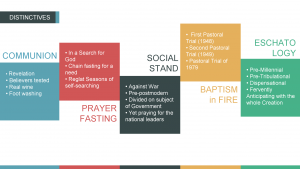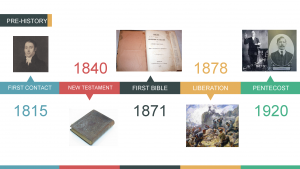Historical and Doctrinal Formation of Holiness Teachings and Praxis among Bulgarian Pentecostals
 Research presentation prepared for the Society of Pentecostal Studies, Seattle, 2013 – Lakeland, 2015, thesis in partial fulfillment of the degree of D. Phil., Trinity College
Research presentation prepared for the Society of Pentecostal Studies, Seattle, 2013 – Lakeland, 2015, thesis in partial fulfillment of the degree of D. Phil., Trinity College
In conclusion, it must be noted that like many other places around the world, Bulgarian Pentecostalism began and continues to be in the periphery of both social and religious life. The movement has been persecuted as new, extreme, outcast and even satanic, but in the end Pentecostalism prevailed from the periphery. The only problem with holding strong in the periphery of society is that you spend all your money, all your time, all your motivation, everything you have to change the center – to change reality itself. It demands an extreme internal passion to continue and to become a movement of social influence. For the external observer this makes no sense. The time and resources spent could be so much helpful somewhere else. Perhaps, in an environment that is more suitable for the center – more controlled by the center. And an environment that does not make the center look bad.
But when this environment is not the center itself, then the periphery becomes a public enemy to the centralized society and is discarded as crazy, obscene and even inhumane. To the point that after giving it all, you start to feel like it was all spent for nothing.
Then you get back to the mission that is more important than our feelings or emotions and convince yourself with all you have left, that the end result is worthy. And then one day you wake up in the center of reality. Even more, you become the center of reality.
And the question remaining is how to balance the center with the periphery. If we were always in the center of culture, religion and economics, we would have never heard the voice of the God of the periphery. The God of the enslaved, oppressed, persecuted, poor, sick and suffering – God of the miraculous…
Historical and Doctrinal Formation of Holiness Teachings and Praxis among Bulgarian Pentecostals
by Dony K. Donev, D.Min.
Historical and Doctrinal Formation of Holiness Teachings and Praxis among Bulgarian Pentecostals (Research presentation prepared for the Society of Pentecostal Studies, Seattle, 2013 – Lakeland, 2015, thesis in partial fulfillment of the degree of D. Phil., Trinity College)
Protestant work in Bulgaria began in 1815 when agents of British and Foreign Bible Society, Robert Pinkerton (1780-1859) and Benjamin Barker (d.1859), initiated a search for Bible translators in the spoken Bulgarian vernacular. As a result a new translation of the New Testament in Bulgaria was published in 1840 and the whole Bible in 1871.
By the liberation of Bulgaria from Turkish Yoke in 1878 Protestantism was well established in Bulgaria. Graduates from Protestant Robert’s College became prominent politicians in the new Bulgarian state. When the first Pentecostal missionaries arrived in 1920, they found a century old protestant tradition in Bulgaria.
40 False Teachings in the Church of the 21st Century
1. That Christianity is a religion and social status, rather than a personal life of holiness and relationship with God.
2. That Christians need standards and rules other than the Bible in order to live a Christian life.
3. That the divinely inspired text of the Bible needs human additions and alterations.
4. That the practices described by the Bible are not for today, as if the Bible is wrong.
5. That Christianity is religion for the weak.
6. That governments and countries are responsible for the growth and prosperity of the church.
7. That we must accept the world in order that the world accepts us.
8. That Postmodernity is Biblical teaching.
9. That the evolution theory is compatible with the Biblical teaching of the Creation.
10. That God needs our strategies, offices, plans and training based on the principles of the contemporary marketing and management in order to lead His Church like His strength has vanished.
11. That the church is successful only because of our personal participation.
12. That the personal works of righteousness are more important than the works of faith which the Word requires from us.
13. That life without sin is not possible.
14. That man has no free will, but is a subject of predetermined choice.
15. That once saved, a person is always saved regardless of the lifetime between his/her salvation and death.
16. That the Trinity is a composite of three different persons, and is not trinitarian nor monotheistic.
17. That Jesus Christ becomes the Son of God only after the incarnation.
18. That the leadership of the Holy Spirit is not needed in the church any longer.
19. That there is baptism of the Holy Spirit without speaking in other tongues.
20. That the gifts of the Holy Spirit can be practiced without a life of holiness.
21. That there is Biblical preaching without confirmation from the Holy Spirit with gifts and miracles.
22. That only elected men can preach the Gospel, as if the preaching of the Gospel is not an obligation of every believer.
23. That the Revival in the church is for a particular period of time and not a personal responsibility for every believer to live a life of revival.
24. That only because the Church does not operate under the anointing given to it, the gifts of the Holy Spirit have ceased to exist.
25. That only because we do not have personal discipline to pray and fast until God answers our prayers, He cannot do miracles as He has done before.
26. That because some prosperity teachings have over exaggerated some doctrines God does not supply needs any longer.
27. That one can change the spiritual laws and reap without having sowed.
28. That it is more blessed to receive than to give.
29. That to show mercy is an act of weakness.
30. That the minorities in the church, which form its ethnic variety, are its worst part.
31. That you can be a part of the Church without being part of the Spiritual Warfare.
32. That you can be victorious without Christ, without his sacrifice on the cross and without the power of his blood.
33. That when you are personally upset with certain people you have the right to simply leave the church.
34. That not going to church as an act of protest is an acceptable form of Christian behavior.
35. That cell groups without leadership and accountability are the apostolic model for the church.
36. That there are two kinds of Christians – layman and clergy, and that the Church must be without structure and hierarchy.
37. That there is no Rapture of the Church.
38. That the Rapture and the Second Coming are the same event.
39. That the Rapture is not before the Tribulation.
40. That the unrighteous and the ones who evidently live a life of sin will participate in the rapture of the Church and will be resurrected with the righteous dead.








